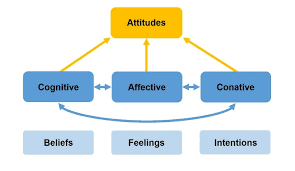-
29 Jul 2025
GS Paper 4
Theoretical Questions
Day 38: "Our thoughts shape our attitudes, and our attitudes shape our actions."Discuss with reference to the relationship between attitude, thought, and behaviour.(150 words)
Approach :
- Briefly introduce the key terms: Thoughts, Attitudes, and Behaviour.
- Mention how these three are interconnected in shaping an individual’s ethical and social conduct.
- Illustrate with relevant examples.
- Conclude with a suitable remark.
Introduction:
Human behaviour is the outcome of complex internal processes, among which thoughts, attitudes, and actions are deeply interconnected. Our thoughts—the cognitive interpretations of the world—form the attitudes we hold, and these attitudes in turn guide our behaviour. This chain determines not only personal conduct but also one’s ethical and professional decisions.
Body :
Relationship Between Thoughts, Attitudes, and Behaviour
- Thoughts Shape Attitudes: Thoughts are beliefs, values, and mental interpretations. Over time, consistent thoughts consolidate into attitudes—relatively stable mental positions about people, issues, or situations.
- Example: A civil servant who constantly reflects on the importance of equality is likely to develop a pro-inclusion attitude.
- Attitudes Influence Behaviour: Once an attitude is formed, it becomes a filter through which actions are evaluated. Positive attitudes encourage constructive behaviour, while negative attitudes may result in prejudiced actions.
- Example: A public official with a positive attitude toward transparency may proactively disclose information under the RTI Act.
- ABC Model of Attitude: This model illustrates how thoughts (cognition) lead to actions via attitude.
- Affective (feeling): Emotional reaction
- Behavioural (action): Tendency to act
- Cognitive (thought): Beliefs and ideas
- Real-World Illustrations:
- Mahatma Gandhi believed in Ahimsa (non-violence). This thought formed his attitude and was expressed in his non-violent struggle against colonialism.
- Whistleblowers like Satyendra Dubey acted ethically because of a strong belief in public accountability.
- Implications in Public Administration: For civil servants, the alignment of ethical thought, positive attitude, and right behaviour ensures integrity, accountability, and citizen-centric governance. Any disconnect may lead to unethical conduct or policy apathy.
Conclusion:
Thus, our thoughts lay the foundation, attitudes act as bridges, and behaviour is the final manifestation. As Swami Vivekananda said, "We are what our thoughts have made us." Cultivating the right thoughts is key to building ethical attitudes and responsible actions in both public and private life.





